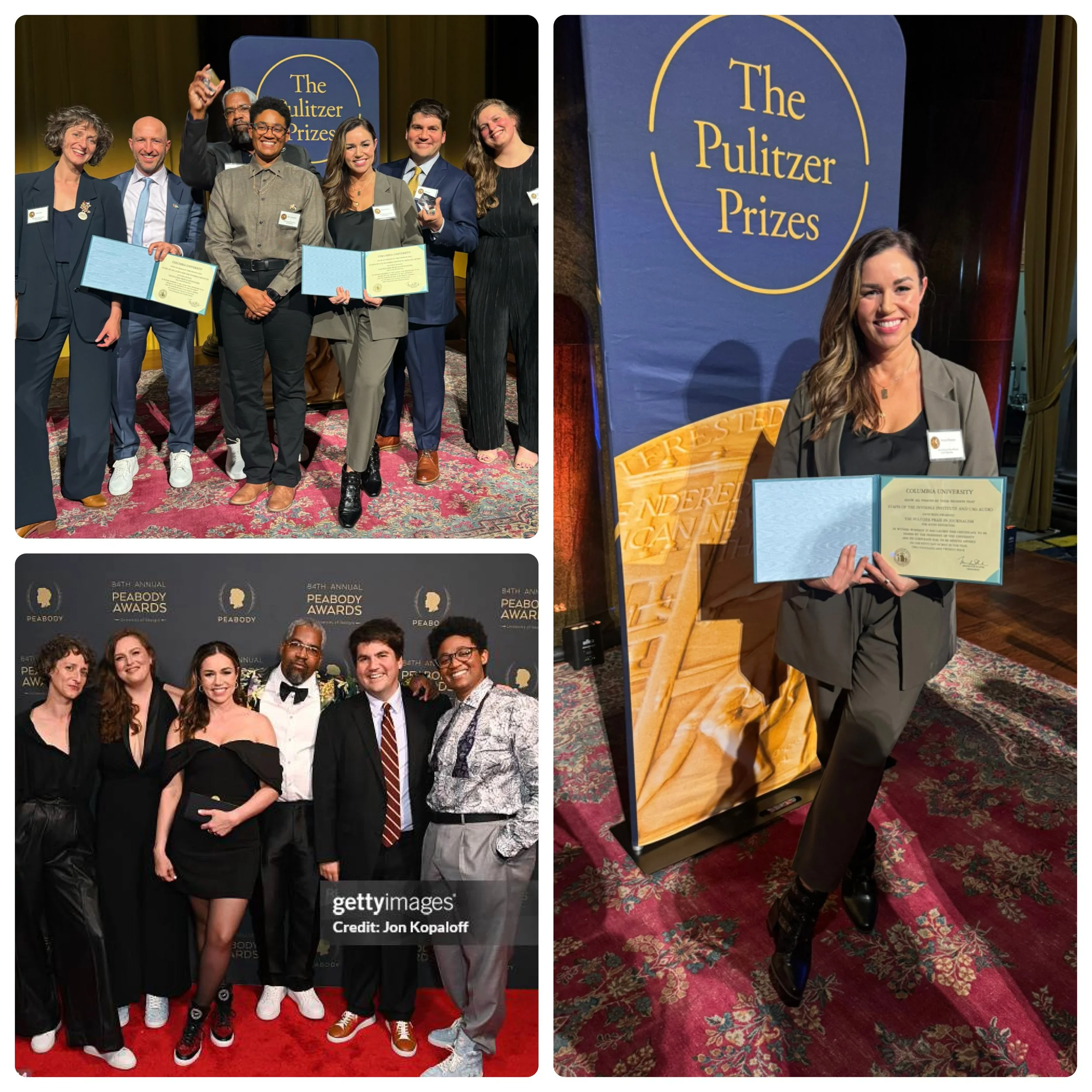“You Didn’t See Nothin” team wins Pulitzer Prize for Audio Reporting and Peabody Award, 2024.
Alison Flowers is a journalist in Chicago, and the founder of Spiralbound, a production company at the intersection of investigative journalism and immersive storytelling.
Prior to Spiralbound, Flowers was the Head of Production at the Invisible Institute, a nonprofit on the South Side of Chicago where she built journalism teams that received four nods from the Pulitzer board in four years. In 2024, Flowers was part of the team that won both the Pulitzer Prize for Audio Reporting and a Peabody Award for “You Didn’t See Nothin” (Invisible Institute and USG Audio). In 2021, Flowers’ audio reporting was also a Pulitzer Prize finalist for the “Somebody” podcast about the 2016 murder of Courtney Copeland. The series prompted an investigation by the Office of the Inspector General in which it recommended disciplining officers and reviewing Chicago Police’s directive around rendering aid. “Somebody,” which was named among The 25 Best True-Crime Podcasts of All Time by Rolling Stone, was co-produced by the Invisible Institute, The Intercept, Topic Studios, iHeart Radio in association with Tenderfoot TV.
“Somebody” received many other honors, including a National Magazine Award/Ellie, the Scripps Howard Award for Excellence in Radio/Podcast Coverage, Best Audio Documentary from the International Documentary Association, a National Headliner Award, a Gracie Award, 2020 Third Coast International Audio Festival Award for Best Serialized Story and topped the list of Rolling Stone’s “Best Podcasts of 2020.” The podcast was also first on The New York Times’ list of “true crime podcasts at the intersection of race,” and #2 on The Atlantic’s “The 50 Best Podcasts of 2020.”
Flowers’ investigative work has appeared in The Guardian, TIME, The Village Voice, VICE, The Intercept, The Daily Beast, Chicago Reader, and she is a two-time winner of the Hillman Foundation’s Sidney Award. Her 2016 investigation into how Illinois’ felony murder law can obscure police misconduct contributed to a critical amendment of what had previously been one of the most damaging and expansive felony murder statutes in the country. Her journalism has also contributed to the release of two innocent people in prison: Jennifer Del Prete, in partnership with the Medill Justice Project, and Robert Johnson, in partnership with the Invisible Institute.
In 2019, Flowers co-produced the SHOWTIME documentary “16 Shots” on the police killing of Laquan McDonald, which won the Emmy for Outstanding Investigative Documentary, received Television Academy Honors for documentary special, and earned a Peabody nomination.
Flowers is the author of “Exoneree Diaries: The Fight for Innocence, Independence and Identity” (Haymarket Books, 2016), first place winner of the 2017 Eric Hoffer Book Award (Small Press), first place winner of the Illinois Woman’s Press Association’s Mate E. Palmer Professional Communications Contest, and the Chicago Writer’s Association’s Honorable Mention for Book of the Year in Nonfiction. The title was also selected by the Illinois Secretary of State for the statewide “Illinois Reads” program and earned a 2016 Nautilus Silver Award for Journalism and Investigative Reporting. In 2013, Flowers produced a multimedia series about exonerees for Chicago Public Media and NPR affiliate WBEZ. The yearlong project was a finalist for a national Online Journalism Award. Flowers is also the former Executive Editor of the Chicago Police Torture Archive and contributed to the anthology “Who Do You Serve? Who Do You Protect?: Police Violence and Resistance in the United States.”
Flowers has been featured as a consultant on Dateline and has spoken at national venues such as SXSW and the White House about her work. She has been quoted in justice-focused stories in numerous media outlets, including Newsweek, USA Today, Vox, ABC News, The New York Daily News and the Christian Science Monitor. In 2016, she was featured at Book Expo America, as well as many other TV and radio shows, including “Democracy Now!”.
From 2011 to 2013, Flowers worked as a research associate at Northwestern University’s Medill Justice Project where she contributed to wrongful conviction investigations and explored other systemic criminal justice issues. Flowers wrote several stories for the project’s “Spotlight on Shaken-Baby Syndrome,” which was awarded a Peter Lisagor Award by the Chicago Headline Club, the largest chapter of the national Society of Professional Journalists.
Prior to her work at Medill, Flowers worked as an on-air TV reporter in Georgia. There she broke the story when serial murder crime scene evidence — viable material for DNA testing that a judge testified in federal court had been destroyed — was discovered in a police department basement. The revelation ultimately led to a stay in a death row inmate’s scheduled execution, resulting in the first DNA tests in the more than 30-year-old case. Flowers’ work also made national headlines when she reported that a Georgia homeless shelter discriminated against LGBTQ community members. In another watchdog story, a police chief and Georgia peace officer trainer resigned after Flowers brought to light he had fired a warning shot at a man suspected of marijuana possession.
Flowers is a Northwestern University alumna, having earned a master’s degree from the Medill School of Journalism in 2009. The Academy of Motion Picture Arts and Sciences recognized a short documentary that Flowers produced as a semi-finalist for a student Academy Award in 2010. She also holds a graduate liberal arts degree in Religion and Literature.
An alumni fellow with the Social Justice News Nexus, Flowers is also a member of the journalism honor society KAPPA TAU ALPHA, the American Society of Journalists and Authors, the Association for Women Journalists the Journalism and Women Symposium, and The OpEd Project.
